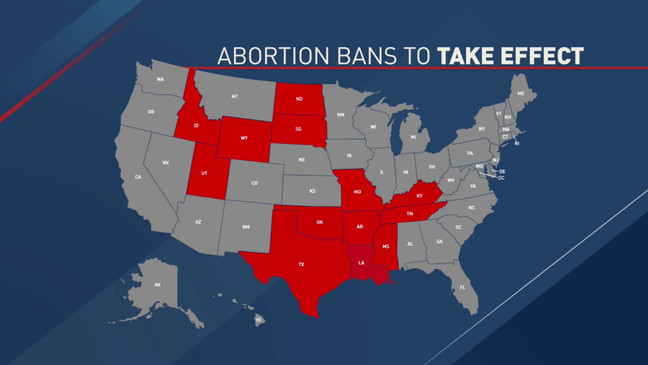Trigger Laws: What are They and Which States Have Them?
Map of the 13 States with Trigger Laws
June 10, 2022
Supreme Court Justice Alito’s leaked draft opinion regarding the constitutionality of Roe v. Wade has been followed by prompt responses, with legislators in 13 states having already passed “trigger laws” intended to go into effect if Roe is overturned.
These so-called “trigger laws” are ultimately prohibitions on abortions, and they are expected to be enforced immediately after the landmark decision protecting a woman’s bodily autonomy is countermanded.
“Trigger laws defeat the point of rights, for there should not be exceptions to reproductive rights. The fact that laws have to be made for abortions to be illegal shows that they should be legal in the first place, with no exceptions,” said sophomore Ariana Aray.
Almost all of the 13 states with established interdicts against women’s fundamental reproductive rights have had a long history of opposition to the institution of the 1973 U.S. Supreme Court decision on the legality of abortions. “Some states that are very strongly anti-abortion, having been frustrated that they couldn’t ban abortion because of Roe v. Wade, decided to pass laws that would be on the books and operative immediately in the future event that the court ever removed the protections of Roe,” said Donna Crane, a professor at San José State University, to The New York Times.
Although the 13 states planning to implement “trigger laws” will simultaneously do so if Roe v. Wade is overturned, the exact features of these bans, along with what they entail, differ depending on the independent state.
Arkansas
With the exception of a life-threatening medical emergency, Arkansas is poised to enforce a law that would ultimately ban all abortions. If a medical provider so chooses to violate this law, or even endeavor to contravene the said order, he or she could be charged with up to 10 years in prison, a fine of up to $100,000, or both.
Idaho
If Roe is overturned, having an abortion in Idaho entails a punishment of up to five years in prison. The only exceptions that the state of Idaho has decided to instill are in the case of rape or incest, or if the pregnant person’s life is gravely threatened.
Kentucky
In 2019, Kentucky’s legislature had created a bill that would render performing an abortion an illicit act if the overturning of Roe v. Wade transpires. This felony offense would be administered with limited exceptions provided in the case that abortion was executed to prevent death or critical injuries.
Louisiana
The overruling of Roe would endow the state of Louisiana with the authoritative power to not only prohibit medical providers from performing abortions, but also ban the provision of drugs that could induce feticide.
Mississippi
Mississippi has released a statement disseminating that within 10 days of the state attorney general confirming the overturning of Roe v. Wade, abortions will be deemed illegitimate in the state. Exceptions, notwithstanding their limitations, do exist in the cases of rape or if pursuing the pregnancy would imperil the life of the individual with a developing fetus.
Missouri
If Justice Alito’s draft opinion is implemented, Missouri’s proposed law, adjudging the execution of abortion a felony offense, will be put into effect instantaneously. The sole exception to Missouri’s ban on abortion is if it is performed in the event of a medical extremity.
North Dakota
A law, approved by the North Dakota legislature in 2007, will make the provision of abortion unconstitutional unless it is provided to save the life of the person conceiving a child.
Oklahoma
Either a fine of $100,000, a maximum of 10 years in state prison, or both can be inflicted upon individuals who have performed, or are attempting to perform, abortion, with saving the life of the pregnant individual being the only exemption provided.
South Dakota
South Dakota’s trigger ban, that has been on the books since 2005, will deem performing an abortion illegal, except in the event of a life-threatening medical emergency.
Tennessee
If the Supreme Court overturns Roe v. Wade, a ban on abortion will be implemented in the state 30 days after the news of the overruling is disseminated. Preventing death or serious injuries are the only exceptions to this ban.
Texas
Similar to Tennessee’s protocols, abortion will be banned 30 days after Roe v. Wade is overturned by the Supreme Court. The only exceptions are to prevent death or grave injuries.
Utah
Enacted in May 2020, almost all abortions will be immediately rendered illicit if Roe is overturned. Exceptions include preventing fatalities or serious injuries, cases of rape or incest, or the possibility of the child being born with debilitating birth defects.
Wyoming
Last month, Wyoming issued an edict with provisions that would make it illegal to perform an abortion if Roe v. Wade is overruled. The exceptions to this law are exceedingly limited, with cases of incest, sexual assault, or the risk of fatality or severe injury to the person giving birth being the only exemptions from retribution.






